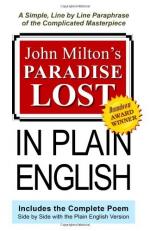|
This section contains 1,437 words (approx. 5 pages at 300 words per page) |

|
SOURCE: "The Ghost of Milton," in The Common Asphodel: Collected Essays on Poetry, 1922-1949, Hamish Hamilton, 1949, pp. 321-5.
In the following excerpt, Graves assesses Milton as "a minor poet with a remarkable ear for music, before diabolic ambition impelled him to renounce the true Muse and bloat himself up … into a towering rugged poet."
… With all possible deference to his admirers, Milton was not a great poet, in the sense in which Shakespeare was great. He was a minor poet with a remarkable ear for music, before diabolic ambition impelled him to renounce the true Muse and bloat himself up, like Virgil (another minor poet with the same musical gift) into a towering, rugged major poet. There is strong evidence that he consciously composed only a part of Paradise Lost; the rest was communicated to him by what he regarded as a supernatural agency.
The effect of Paradise...
|
This section contains 1,437 words (approx. 5 pages at 300 words per page) |

|


